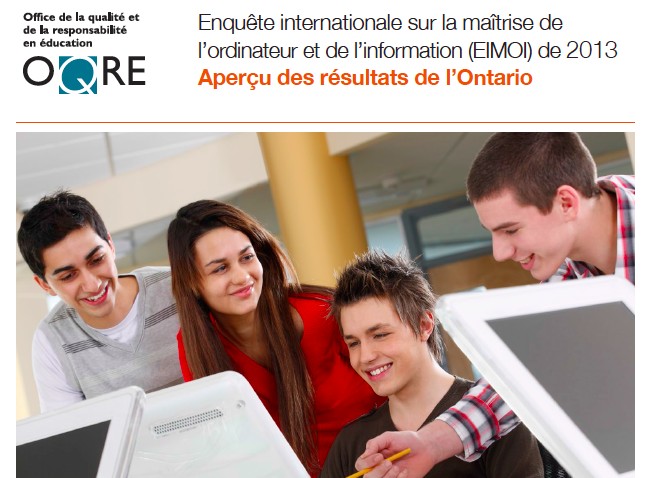Vingt pays ont pris part à l’Enquête internationale sur la maîtrise de l’ordinateur et de l’information (EIMOI) de 2013. Au Canada, seulement deux provinces ont participé : l’Ontario et Terre-Neuve-et-Labrador. Le score moyen des élèves de l’Ontario (547) était considérablement plus élevé que le score moyen international (500).
TORONTO, le 20 nov. 2014 /CNW/ – Les élèves de l’Ontario se classent parmi les premiers en matière de maîtrise de l’ordinateur et de l’information (MOI) dans le cadre de la toute première Enquête internationale sur la maîtrise de l’ordinateur et de l’information (EIMOI) de 2013, selon les rapports diffusés aujourd’hui par l’Office de la qualité et de la responsabilité en éducation (OQRE) et le Conseil des ministres de l’Éducation (Canada) (CMEC). Aucun groupe d’élèves des instances participantes n’a obtenu de meilleurs résultats que les élèves ontariens.
Les résultats de rendement de l’Ontario au MOI étaient considérablement supérieurs à la moyenne internationale. En outre, les résultats à des questionnaires faisant suite à l’EIMOI de 2013 indiquent que les élèves et le personnel enseignant de l’Ontario utilisent les technologies de l’information et de la communication (TIC) pour l’apprentissage et qu’ils manifestent une attitude positive quant à leur pertinence. La plupart des écoles de l’Ontario donnent priorité à faciliter l’utilisation des TIC dans l’enseignement et l’apprentissage, mais des obstacles subsistent à ce sujet.
FAITS EN BREF
- L’EIMOI est la première étude internationale sur l’acquisition, par les élèves, de compétences en MOI. Elle a été administrée à un échantillon aléatoire d’environ 60 000 élèves de 8e année dans près de 3 300 écoles de 20 pays, y compris le Canada. Seules deux provinces canadiennes ont pris part à cette étude, dont l’Ontario. Puisqu’un échantillon représentatif d’élèves de l’Ontario a participé, il est possible d’établir des comparaisons fiables entre l’Ontario et les autres instances participantes.
- Le score moyen des élèves de l’Ontario (547) était considérablement plus élevé que le score moyen international (500). Aucun groupe d’élèves des autres instances n’a obtenu de meilleurs résultats que les élèves de l’Ontario. Les résultats des élèves de la République tchèque et de l’Australie étaient comparables à ceux de l’Ontario.
- Les élèves de l’Ontario ont affirmé avoir de l’expérience en informatique et être confiants dans leur capacité à utiliser les TIC. Ils aiment aussi utiliser les TIC.
- Le personnel enseignant de l’Ontario a déclaré avoir de l’expérience en informatique et être confiant dans sa capacité à utiliser les TIC. Il croit que ces technologies bonifient l’apprentissage.
- La plupart des écoles de l’Ontario disposent des ressources en TIC nécessaires pour leurs activités d’enseignement et d’apprentissage.
- La plupart des écoles de l’Ontario donnent priorité à faciliter l’utilisation des TIC dans l’enseignement et l’apprentissage.
- Le personnel enseignant et les coordonnatrices et coordonnateurs des TIC de l’Ontario ont identifié un certain nombre d’obstacles concernant l’utilisation des TIC dans le cadre de leurs activités d’enseignement et d’apprentissage.
« Le succès des élèves de l’Ontario à l’EIMOI de 2013 devrait inspirer à la fois fierté et confiance étant donné la grande importance de la maîtrise de l’ordinateur et de l’information (MOI) à l’ère numérique. »
— Brian Desbiens, président du conseil d’administration de l’OQRE
« Les résultats à l’EIMOI de 2013 confirment que les élèves, le personnel enseignant et les directions d’école en Ontario exploitent le pouvoir des technologies de l’information et des communications pour appuyer l’apprentissage. Notre système éducatif moderne se doit de construire sur ces bases solides et de continuer à favoriser l’utilisation des TIC à l’école. L’OQRE assumera son rôle, alors qu’il poursuit sa transition vers l’administration en ligne des tests provinciaux. »
— Bruce Rodrigues, directeur général de l’OQRE
POUR EN APPRENDRE DAVANTAGE
- Enquête internationale sur la maîtrise de l’ordinateur et de l’information (EIMOI) de 2013 : Aperçu des résultats de l’Ontario
- EIMOI 2013–Préparer l’avenir à l’ère numérique: Les résultats de l’Ontario et de Terre-Neuve-et-Labrador (rapport du CMEC)
L’EIMOI est une évaluation en ligne sur la compréhension et l’utilisation par les jeunes des technologies de l’information et des communications (TIC) à l’ère numérique. Il s’agit de la première étude du genre sur l’acquisition, par des élèves de 8e année, de la maîtrise de l’ordinateur et de l’information (MOI) dans la perspective de recherches comparatives internationales. Administrée pour la première fois en 2013, l’EIMOI est un programme de l’Association internationale pour l’évaluation du rendement scolaire (AIE).
Vingt pays ont pris part à l’EIMOI de 2013. La participation de l’Ontario a été coordonnée par le Conseil des ministres de l’Éducation (Canada) (CMEC). Au Canada, seulement deux provinces ont participé : l’Ontario et Terre-Neuve-et-Labrador. Puisqu’un échantillon représentatif d’élèves de l’Ontario (de langue française et de langue anglaise) a participé à l’EIMOI de 2013, il est possible d’établir des comparaisons fiables entre l’Ontario et les autres instances participantes. La participation de l’Ontario a été coordonnée par l’OQRE au nom du gouvernement provincial.
Au total, près de 60 000 élèves d’environ 3 300 écoles de 20 pays ont participé à l’EIMOI de 2013. Environ 3 700 élèves de l’Ontario de près de 200 écoles (de langue française et de langue anglaise) y ont pris part. Comme cette évaluation est uniquement administrée à un échantillon d’élèves choisis au hasard dans un échantillon d’écoles choisies également au hasard, les résultats individuels des élèves, des écoles et des conseils scolaires ne sont pas disponibles.
Les tests de l’OQRE mesurent le rendement des élèves en lecture, en écriture et en mathématiques par rapport aux attentes et contenus d’apprentissage prescrits dans Le curriculum de l’Ontario. L’OQRE coordonne également la participation de l’Ontario à des évaluations internationales au nom du ministère de l’Éducation. Les données obtenues assurent la responsabilisation du système éducatif de l’Ontario financé par les deniers publics et fournissent une mesure de sa qualité. En présentant ces importantes données probantes relatives à l’apprentissage, l’OQRE fait fonction de catalyseur pour augmenter la réussite des élèves de l’Ontario.
SOURCE Office de la qualité et de la responsabilité en éducation (OQRE)














